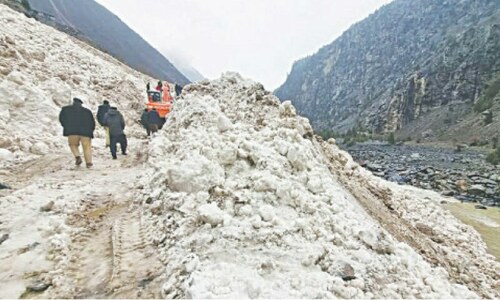
TWO films by Palestinian filmmakers premiered at the Red Sea International Film Festival depict the struggles of the Palestinian families, especially the youth, as they struggle to survive homelessness caused by Israel atrocities and frequent offensives. Yalla Parkour and To a Land Unknown have been directed by the filmmakers who are second generation of Palestinian refugees.
Yalla Parkour is a documentary kind of poetic monologue of Areeb Zuaiter with her late mother as well as an online dialogue with a young boy, Ahmed, from Gaza Strip. The narrative shifts from personal story and collective memory of her family and its life in Palestine to the life of fun-loving boys doing parkour tricks despite violence all around them.
The boys, including Ahmed, hop around and climb the rundown, bombed building structures, incomplete shopping malls and destroyed parking plazas that symbolise shattered dreams of the Palestinians.
They have a devil-may-care attitude towards the tough life in the face of Israeli offensive and go about their business of parkour, performing acrobatic feats where they find the place. Ahmed records them in short videos and posts them online. Director Areeb Zuaiter found one such video showing boys frolicking with smoke from bomb explosions billowing in the background. She contacted Ahmed who was then a boy entering his teens. This was way back in 2014.
Yalla Parkour and To a Land Unknown directed by second-generation Palestinian refugee filmmakers
In the film, Ahmed talks about the resilience of the people of Gaza, terming them different as what they put up with is unbelievable. The documentary records the ambitions of Ahmed of getting out of Gaza during his recorded calls with Areeb.
“I knew the team (of boys doing acrobatics) in 2014 when I started the video and the ‘bombing video’ of Ahmed. Before the current Israeli offensive, it was the longest offensives on Gaza followed by another one in 2015 and then 2018 and then 2020. They were always able to put up with that,” she said while speaking about the film. Areeb herself and her family are the second part of the film which moves alternately from the story of Ahmed to Areeb’s mother and her own identity.
“There is a layer of theme of identity in the film. I was born in Nablus (West Bank) but I never lived there. We left as soon as I was born, then we lived in Riyadh and Lebanon, Jordan and then the US. I have a sense of loss of identity somehow, especially when I was young, I had a different accent and my cousins used to bully me, saying you don’t speak like Palestinians,” says the director.
Ahmed’s parkour feats help him get out of the country and move to Sweden; however, his family is still stuck in Gaza.
To a question what happened to Ahmed’s mom and family, she said their house was bombed and they lost most of their house except one room and she decided to go back as she found it hard to see Ahmed’s mom because she decided at the end that she did not want to live in other people’s houses or in refugee camps and returned to her destroyed home. She said the young Ahmed is taking therapy in Sweden to deal with the situation of helplessness.
Areeb said the documentary film changed her a lot at the personal level. “I never expected that I would make this film as I never anticipated my mom’s story and our relationship to be exposed in a film. It was a journey as well as self-discovery.”
To a Land Unknown, a feature film directed by a Danish-Palestinian filmmaker, tells the story of two Palestinian cousins, stuck in Athens, Greece, on their way to Germany as immigrants. With their families living in refugee camps in Lebanon, waiting for them to make it to the land of their dreams and support them, they, Chatila and Reda, get stuck in Athens.
They struggle to even make ends meet and turn to petty crimes for sustenance. As they try to keep hold of their life in a foreign land, they keep falling into deeper troubles as they make an attempt at human trafficking to make enough money to cross borders. What keeps them going is the daydreaming of having a hotel business in Berlin. The younger cousin, Reda, feels worse of living conditions and wants to return to his “home” due to homesickness. However, his mother pushes him further to a better life.
The film does not give a false hope to viewers and depict the reality of Palestinian refugees turned homeless by Israel. It does not try to create heroes of a fantasy world but shows the two main characters as real young men unable to change their lives.
Published in Dawn, December 12th, 2024














































